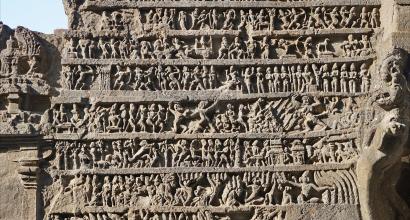Role of Respite
An optimum respite from active versification helps retention. While the span of such respite is typically a few minutes in Aṣṭāvadhānam, it is a few hours in Śatāvadhānam. Overnight respite that Śatāvadhānam offers—along with the comfort of sleep—is especially helpful. This is similar to leaving a trough of murky water untouched: with time, all the dirt settles down, making it easy to decant clear water. Svāmī Vidyāraṇya observes:
If one does not remember [Vedic hymns] despite repeated recitation, he finds it easy to recall the same on the next day, without having to revise.[1]
Sleep, the best mode of respite, enhances memory. In this connection Svāmī Vidyāraṇya says:
Through the force of habit, a reciter of the Vedas continues to chant them during sleep (in dreams), as does one with a penchant for meditation. A person who wishes to contemplate [upon the import of the Vedas] should follow this [such that the activity becomes his second nature].[2]
Indian tradition believes that the dream-state is linked to memory. Vāgbhaṭa, the celebrated author of Aṣṭāṅga-hṛdaya, identifies seven types of objects that characterize dream:
[The basis of] dream is seven-fold: objects of sight, sound, and feeling; objects that one desires; objects that one imagines; objects that one has not come across; and objects based on bodily humours.[3]
This reinforces the fact that sleep (dream-state, per se) re-organizes memory and assists retention. The basis for all this discussion is Praśnopaniṣad, which says:
In sleep, the Supreme (mind) experiences greatness. He sees what has been seen, hears what has been heard; he experiences what has been experienced in various places and directions. He sees everything time and again: what has been seen and what has not been seen, what has been heard and what has not been heard, what has been experienced and what has not been experienced, what is existent and what is non-existent.[4]
People have worked wonders based on the knowledge triggered during dreams. Such instances are legion. Appayya-dīkṣita commenting on Yādavābhyudaya, Elias Howe deciding on the position of the needle’s eye, August Kekulé formulating the structure of Benzene, William Watts improving the design of lead shots, and Giuseppe Tartini composing The Devil’s Sonata are a few examples.
Other Nuances Regarding Memory in Avadhānam
A performer finds it most easy to remember his own compositions as against those of others. The reason for this is not hard to seek: the process of versification involves numerous commissions and omissions of words, and the performer sorts out all this in his mind. Therefore, the five features that constitute retention are firmly established. This is not the case with others’ verses. In literary challenges, the performer readily recalls the three lines he composed as part of his solution, as contrasted with the single line posed as challenge. By this we understand that the period and intensity of active composition are pivotal to retention.
Repeatedly listening to verses composed by others does not ensure immediate, long-term retention. While engaged in composing verses, one is intensely attentive; this is not so much the case with listening. Additionally, composition is a process that expects the poet to concentrate—and hence spend adequate time—on every syllable. This is akin to writing. Listening, on the other hand, is an instantaneous phenomenon; it does not allow us to be attentive to all its constituent parts. J Sadananda Sastry explains this with a memorable example: Recalling one’s own verses is like calling our children to come to us; recalling others’ verses is like trying to catch the attention of our neighbour’s child.
Natural Enhancers of Memory
The genetic makeup of an individual largely accounts for his capacity of retention. Several factors assist to maintain, polish, and improve this natural capability. Of these, a healthy lifestyle is the foremost. Apart from adequate sleep, food and exercise are integral to the memory-enhancement process. Modern medicine is of the opinion that a plant-based diet or Mediterranean diet is best suited to maintain health, and by extension, good memory. Indian tradition advocates the consumption of sāttvika-āhāra to achieve the same end. Accordingly, “foods that promote longevity, vitality, stamina, health, happiness, and contentment and foods that are tasty, mild, nourishing, and pleasant are dear to those of the nature of sattva.”[5]
Exercise is another factor that helps enhance memory. Taking long walks amidst verdant surroundings almost invariably helps. This is perhaps because walking offers the much-needed personal time to collect and organize one’s thoughts.
Most importantly, svadharma-yoga as enunciated in the Bhagavad-gītā is an unfailing nourisher of memory. A natural consequence of svadharma-yoga is love for work that is inclined to one’s natural proclivities. This is yet another memory-stimulant. Indeed, love for the subject is the prime enhancer of memory. Many people do not subscribe to this, but this is a fact verified from our experience. If we were to prepare a list of Avadhānam FAQs, “What is the secret of your memory? How can we cultivate it?” would occupy the first position. Oftentimes, a whole discourse on memory, including everything we have discussed thus far, does not convince people who ask such questions. Further, many people consider elaborate expositions off-putting. They expect answers to come in capsules. And so here it is. If you want to remember something unfailingly, love it unconditionally.
Loving an object entails spending maximum time with it. This ultimately leads to unison of subject and object. And this ensures perfect retention. Details concerning ourselves seldom escape from our memory; this is because we love ourself the most. Readers might see a point of contention at this juncture: common experience avers that we remember objects and people that we find appalling—those we hate and desist. Episodes that we wish would evaporate from our memory linger for a long time. The reason for this is the following—any impactful emotion leaves its imprint behind. This might lead people to the conclusion that it is possible to boost memory through hate. How do we reconcile these diverging opinions?
Although love and hate proceed in opposite directions, they are chips of the same block. While it takes hardly any effort—both mental and physical—to love, hate requires enormous exertion. Loss of love leads to distress; loss of hatred leads to happiness. It is hence prudent to use love to acquire something. Further, love reinforces retention. R Ganesh has unconditional love for all aspects of Indian culture, classical literature, and Avadhānam. This acts as a coalescing agent to bind together the knowledge of all these subjects; it also bolsters memory connected with them.
Acquiring mastery over a subject is doubtless difficult. Passionate love for the subject makes one forget the ordeals in the course of knowledge-acquisition. Love, as they say, is blind to hardships. Once we gain mastery—i.e., when love is fully blossomed—trials previously encountered transmute into strength that propels future endeavours. As Kāli-dāsa would have it, “kleśaḥ phalena hi punar navatām vidhatte.”[6]
Any endeavour that has its basis in love does not highly regard external attributes.[7] Work of this kind ceases to be a mere activity; it transforms into Karma-yoga. In the words of Bhava-bhūti, “unconditional love stands forever unchallenged; it sews the torn patches of the fabric of our interiors.”[8]
Open-mindedness is an invariable requisite of love. Bhagavān Kṛṣṇa unequivocally asserts: “Never share this (Supreme Knowledge) with one who lacks dedicated devotion, one who does not care to listen, or one who is biased against me.”[9]
A true devotee is one with unchanging love. Nārada-bhakti-sūtra (1.2) defines devotion as the highest form of love. Lack of love engenders prejudice; endeavours bereft of love never transform into tapas. The Sanskrit word for love, ‘prema,’ is derived from the root ‘prīñ-tarpaṇe,’ which means ‘to satiate.’ Seen in this light, love is never passive. It always tries to please, to satisfy. Under the influence of love, preoccupations of the mind cease to exist. Nothing else remains other than the object of love. Indeed, one forgets oneself in such a state. Perhaps only Rādhā and Kṛṣṇa know the nature of true love:
राधा पुनातु जगदच्युतदत्तचित्ता
मन्थानमाकलयती दधिरिक्तपात्रे।
तस्याः स्तनस्तबककुड्मललोलदृष्टि-
र्देवोऽपि दोहनधिया वृषभं निरुन्धन्॥[10]
With her mind fixed on Kṛṣṇa, Rādhā churns an empty pot. Kṛṣṇa, with his eyes glued to her beautiful bosom, tries to milk an ox. May this couple protect the world!
This is not mere forgetfulness; it is being completely absorbed in the object of love, and by extension, in its memory.
[1] बहुवारमधीतेऽपि तदा नायाति चेत्पुनः।
दिनान्तरेऽनधीत्यैव पूर्वाधीतं स्मरेत् पुमान्॥ (Vedānta-pañcadaśī, 9.36)
[2] वेदाध्यायी ह्यप्रमत्तोऽधीते स्वप्नेऽधिवासतः।
जपिता तु जपत्येव तथा ध्यातापि वासयेत्॥ (Vedānta-pañcadaśī, 9.81)
[3] दृष्टः श्रुतोऽनुभूतश्च प्रार्थितः कल्पितस्तथा।
भाविको दोषजश्चेति स्वप्नः सप्तविधो मतः॥ (Aṣṭāṅga-hṛdaya, 2.6.60–61)
[4] अत्रैष देवः स्वप्ने महिमानमनुभवति। यद्दृष्टं दृष्टमनुपश्यति श्रुतं श्रुतमेवार्थमनुशृणोति देशदिगन्तरैश्च प्रत्यनुभूतं पुनः पुनः प्रत्यनुभवति दृष्टं चादृष्टं च श्रुतं चाश्रुतं चानुभूतं चाननुभूतं च सच्चासच्च सर्वं पश्यति सर्वः पश्यति॥ (Praśnopaniṣad, 4.5)
[5] Ref: Bhagavad-gītā, 17.8 [Translated by Koti Sreekrishna and Hari Ravikumar as part of The New Bhagavad-Gita]
[6] Kumāra-sambhava, 5.86
[7] व्यतिषजति पदार्थानान्तरः कोऽपि हेतु-
र्न खलु बहिरुपाधीन् प्रीतयः संश्रयन्ते॥ (Mālatī-mādhava, 1.20)
[8] अहेतुः पक्षपातो यस्तस्य नास्ति प्रतिक्रिया।
स हि प्रेमात्मकस्तन्तुरन्तर्मर्माणि सीव्यति॥ (Uttara-rāma-carita, 4.17)
[9] इदं ते नातपस्काय नाभक्ताय कदाचन।
न चाशुश्रूषवे वाच्यं न च मां योऽभ्यसूयति॥ (Bhagavad-gītā, 18.67)
[10] Śrīkṛṣṇa-karṇāmṛta, 2.25
To be continued.
















































